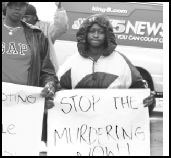I HAVE JUST RETURNED from Aaron Roberts’ funeral.
The service was held three blocks from my home. Several hundred people packed the New Hope Baptist Church. It was a highly politicized funeral, concerned less with Roberts’ life than with how he died. According to the official police account, Roberts fled a traffic stop, dragging one police officer with him through his open car window, and eventually was killed by another officer.
That account was viewed with skepticism by people who attended the funeral. But the most noticeable thing about Roberts’ service was who wasn’t there. Almost no whites. Certainly nobody from the city, let alone the Seattle Police Department. None of the so-called “leaders” of the black community had a role in the mourning; instead they were characterized by speaker after speaker as distant tokens who do not represent this neighborhood (King County Council member Larry Gossett, Seattle City Council member Richard McIver, and camera-chasing James Kelly of the Urban League came in for particular criticism). One need not share the Central District’s rage to at least pay one’s respects for a tragedy. White Seattle chose to stay away.
Much of Seattle seems, by and large, either perplexed or enraged by Central District residents’ anger over Roberts’ death. Over and over, my neighborhood is told to shut up: Roberts was a felon. The officers—Craig Price and Greg Neubert—had no choice. Price and Neubert do good work. There is no racism here. You’re picking the wrong cause. You’re discrediting yourselves.
Most of all, we hear, as one police commander scoffed, “What is prejudice is when people come out and claim racism without any known facts other than the color of the deceased.” These white folks—it’s a pretty safe assumption that they’re almost all white—are missing the point; not by a mile, by light years.
I am not black. I’m not subject to racial profiling or the scorn of the city. But someone’s got to say something. I am a white neighbor, and I’m angry, too. So allow me to try to explain.
What official, white Seattle calls “racism” is that my neighbors are incensed at the unquestionable fact that, year after year after year, the Seattle Police Department kills people, that a disturbing number of them have been unarmed, and that an extraordinarily disproportionate number of them, including five of the last eight, have been black men. Yes, Roberts had a drug problem, and yes, he tried to flee arrest. That does not mean he deserved to die.
For the last 20 years, despite the existence of an official inquest process, no matter how strong or weak the evidence, every Seattle officer who has killed someone has been cleared of wrongdoing. In Roberts’ case, on the day after his death neighbors talked of witnesses, talked of the notorious thuggishness of Roberts’ killers, and questioned the official police narrative. Meantime, our media failed to ask countless obvious questions about a bizarre story based solely on the word of two men who just killed someone.
But even if we get yet another literally whitewashed inquest, how the death occurred ultimately doesn’t matter. Regardless of the circumstances, the color of the deceased is all that matters.
When people of color get a disproportionate number of the school expulsions, tickets, traffic stops, arrests, lengthy sentences, or executions (planned or otherwise), the problem goes far beyond whether an officer or judge or politician wears a white robe in his or her spare time. Racism, in these cases, is usually an accusation of institutional racism: that Seattle is not color-blind, and the result is that we effectively oppress blacks based on their skin color. And the only thing that’s needed to make the accusation irrefutable is the color of the deceased—time after time after time. In this case, Seattle’s institutional racism is compounded by the SPD’s institutionalized lack of accountability (see “Who’s Watching the Cops?”) and civic Seattle’s institutionalized indifference.
We white people need to get over our defensiveness and our insistence of personal virtue—or, at the other extreme, our guilt—and start acknowledging that something’s not working, regardless of good intentions. It’s white America’s systems, not the attitudes of its individuals, that need the most reform. Conservatives are correct that the ideal is a color-blind society. But it’s clear that we’re not there yet, and for public policy to pretend that we are is both insane and counterproductive.
I don’t have room, or the understanding, to properly describe the mixture of sorrow, fatigue, and rage that characterized Aaron Roberts’ funeral. In apartheid South Africa, in places all over the world where oppressed communities have gathered to bury one of their own, politicized funerals signal a struggle that won’t go away. Unless we start to listen—respectfully—to that sorrow, fatigue, and rage, and unless the very phrase “civic Seattle” comes to include all of us in this city, Seattle will continue to have a big, big problem.







